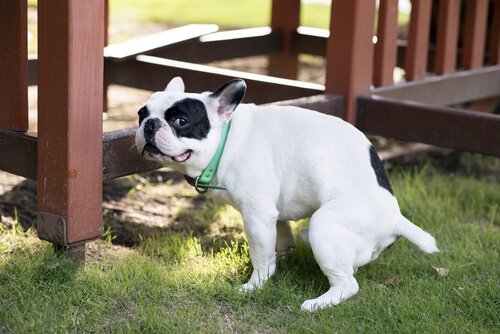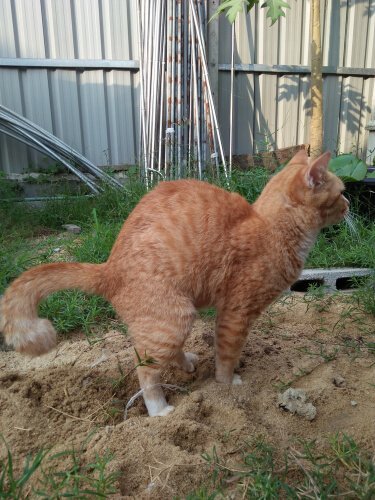How to Treat Your Pet's Constipation

Animals, like humans, get stomach problems. Constipation is the most common problem in pets that can get messy. Fortunately, it isn’t serious if it’s the dog has this condition by itself, especially because it can be treated with homemade remedies. Your dog’s health can get complicated if your pet’s constipation is a symptom of another disease, which you can also learn about below.
What is constipation in pets?
Constipation is the inability to properly process food, which therefore causes the deficiency or inability to normally get rid of waste. It’s a very common disease in cats and dogs, and it can cause a lot of health problems.
The causes of this condition may vary, but the most common cause is related to poor diet and a lack of exercise. Unfortanelty, this condition can cause damage to your pet’s digestive system.
Another cause of constipation in pets is excessive licking. Animals can swallow a lot of hair, which then turns into balls and obstruct the colon. Also, constipation in older dogs can be a symptom of a kidney problem, so it should be monitored closely.
No matter what the case it, only a vet is the authorized person to provide the correct diagnosis for each condition. If your dog or cat experiences any changes, it’s best to talk to your vet and ask any questions that you may have before trying to treat it.

Treating your pet’s constipation
Once the vet has ruled out any diseases, you should start treating your pet’s constipation. Remember that felines and canines have different metabolisms and reactions to different products, so each product will have different instructions according to the species it’s treating.
In general, the remedies that we’ll talk about are easily accessible and some are even found in your home. Many of the products are used on a daily basis, but others may require a small investment.
For dogs
- Fresh water: it’s the main component of a balanced diet and the main catalyst for the entire body. Water helps with all of the digestive system functions and helps everything work correctly inside the animal.
- Olive oil: olive oil has many benefits for dogs, including relief on the digestive system. Add a spoonful or two to your dog’s food and, in a few days, you’ll have a positive outcome.
- Exercises: sometimes a short walk is enough. So, give your pet more time to move around outside of the house; you can even play fetch with a ball to get your dog some exercise.
- Canned food: sometimes, constipation is due to lack of liquid in your dog’s food. Canned food is moist enough to bring moisture to his stools and it can be a good alternative to dry dog food.
- Laxatives: magnesium milk and other laxatives help improve the flow in your dog’s intestines. Also, they don’t tend to cause allergy problems in any breed.

For cats
- Change his sand: in some cases, the sand in your cat’s litter box can cause allergies that keep cats from relieving themselves properly. Try to change the brand or quality and, if the problem persists, you should visit your vet.
- Watch his weight: Overweight cats tend to go to the bathroom several times a day when it’s only normal to do it once or twice. More trips to the bathroom can result in irritation of the anus, which can worsen the condition.
- Change his diet: another reason that cats become constipated is due to a poor diet. Try changing to a cat food that only has animal protein in its ingredients. Dry food can also cause constipation, so changing it with wet food may be a great help.
- Brush his fur: this will prevent him from licking himself and swallowing so much fur. Since the brush will be doing this work instead of his tongue, the hair won’t end up clogging his digestive system.
All of these constipation relief options for pets are meant to be used in cases that are not serious. If your pet has blood in his stools, or is in pain, you should go to the vet immediately to find a solution as soon as possible.
Animals, like humans, get stomach problems. Constipation is the most common problem in pets that can get messy. Fortunately, it isn’t serious if it’s the dog has this condition by itself, especially because it can be treated with homemade remedies. Your dog’s health can get complicated if your pet’s constipation is a symptom of another disease, which you can also learn about below.
What is constipation in pets?
Constipation is the inability to properly process food, which therefore causes the deficiency or inability to normally get rid of waste. It’s a very common disease in cats and dogs, and it can cause a lot of health problems.
The causes of this condition may vary, but the most common cause is related to poor diet and a lack of exercise. Unfortanelty, this condition can cause damage to your pet’s digestive system.
Another cause of constipation in pets is excessive licking. Animals can swallow a lot of hair, which then turns into balls and obstruct the colon. Also, constipation in older dogs can be a symptom of a kidney problem, so it should be monitored closely.
No matter what the case it, only a vet is the authorized person to provide the correct diagnosis for each condition. If your dog or cat experiences any changes, it’s best to talk to your vet and ask any questions that you may have before trying to treat it.

Treating your pet’s constipation
Once the vet has ruled out any diseases, you should start treating your pet’s constipation. Remember that felines and canines have different metabolisms and reactions to different products, so each product will have different instructions according to the species it’s treating.
In general, the remedies that we’ll talk about are easily accessible and some are even found in your home. Many of the products are used on a daily basis, but others may require a small investment.
For dogs
- Fresh water: it’s the main component of a balanced diet and the main catalyst for the entire body. Water helps with all of the digestive system functions and helps everything work correctly inside the animal.
- Olive oil: olive oil has many benefits for dogs, including relief on the digestive system. Add a spoonful or two to your dog’s food and, in a few days, you’ll have a positive outcome.
- Exercises: sometimes a short walk is enough. So, give your pet more time to move around outside of the house; you can even play fetch with a ball to get your dog some exercise.
- Canned food: sometimes, constipation is due to lack of liquid in your dog’s food. Canned food is moist enough to bring moisture to his stools and it can be a good alternative to dry dog food.
- Laxatives: magnesium milk and other laxatives help improve the flow in your dog’s intestines. Also, they don’t tend to cause allergy problems in any breed.

For cats
- Change his sand: in some cases, the sand in your cat’s litter box can cause allergies that keep cats from relieving themselves properly. Try to change the brand or quality and, if the problem persists, you should visit your vet.
- Watch his weight: Overweight cats tend to go to the bathroom several times a day when it’s only normal to do it once or twice. More trips to the bathroom can result in irritation of the anus, which can worsen the condition.
- Change his diet: another reason that cats become constipated is due to a poor diet. Try changing to a cat food that only has animal protein in its ingredients. Dry food can also cause constipation, so changing it with wet food may be a great help.
- Brush his fur: this will prevent him from licking himself and swallowing so much fur. Since the brush will be doing this work instead of his tongue, the hair won’t end up clogging his digestive system.
All of these constipation relief options for pets are meant to be used in cases that are not serious. If your pet has blood in his stools, or is in pain, you should go to the vet immediately to find a solution as soon as possible.
This text is provided for informational purposes only and does not replace consultation with a professional. If in doubt, consult your specialist.








